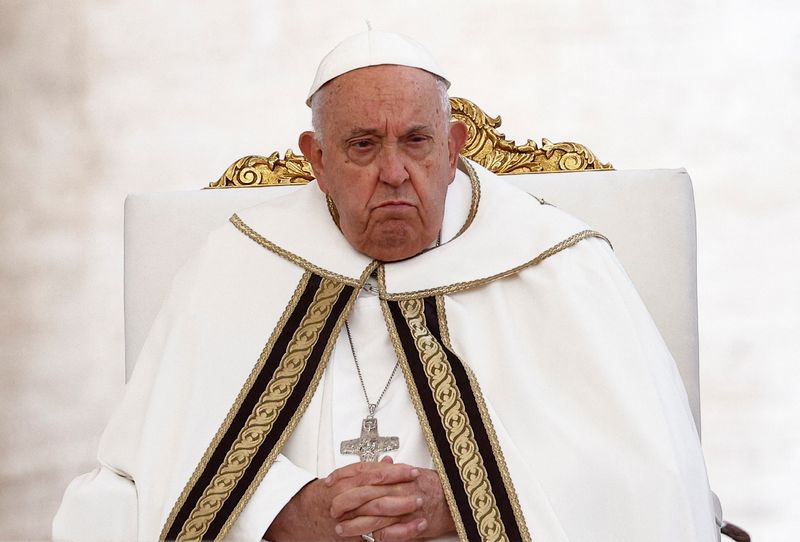By Joshua McElwee
VATICAN CITY (Reuters) - When Pope Francis appoints new Catholic cardinals, as he did on Sunday, the move is often described as the pontiff pushing to influence the group that one day will select his successor.
But while Francis, 87, has now named some 80% of the prelates who will choose the next pope, those who study the church say his choices - often of low-profile churchmen from distant countries, many of whom barely know each other - are not meant to smooth the way for a preferred heir.
"The idea that the pope is capable of influencing his successor is not real," said Alberto Melloni, a church historian at the University of Modena-Reggio Emilia. "It is not even his agenda."
Geographic diversity is important to Francis, an Argentinian born an ocean away from Rome. Among new cardinals that Francis has named over his 11 years as pope, some two dozen have been the first ever chosen from their home countries, which include Haiti, Myanmar, the Central African Republic and Mongolia.
The 21 new cardinals announced on Sunday hail from countries including Argentina, Brazil, Chile, Peru, Ecuador, Italy, Britain, Serbia, Japan, Indonesia, Canada, Ivory Coast and Algeria. One is a Belgian friar serving as archbishop of Tehran-Isfahan in Iran. Another is a Ukrainian Greek Catholic ministering in Australia.
"It's more about geography than about theology," said Massimo Faggioli, a professor at Villanova University in Philadelphia who has chronicled the Francis papacy. "It's generally about giving voice to those who are in the peripheries ... more than a particular vision of the Church."
VEERING FROM TRADITION
Church watchers are sometimes surprised by the pope's picks of figures who are often little known in Rome or lead relatively small Catholic flocks.
He has also veered from tradition that bishops of historically important cities automatically become cardinals. In the U.S., for example, he has made the bishop of San Diego a cardinal, but not the archbishop of Los Angeles. In Italy, the archbishop of Bologna but not the archbishop of Milan.
"The message is: 'I have abolished the right of any diocese to have a cardinal as archbishop,'" said Melloni.
Often the choices appear to be influenced by Francis' preference for what he has called a Church that is "bruised, hurting and dirty because it has been out on the streets".
In 2019, one of Francis' picks, Cardinal Konrad Krajewski, attracted the ire of Italian politicians by climbing down a manhole in Rome to restore electricity to hundreds of homeless people living in an occupied building.
At the pope's death or resignation, cardinals enter into a secret conclave, where those under the age of 80 vote on the next pope. At least 67 countries now have cardinals who can vote in a conclave, according to Vatican statistics, compared to fewer than 50 countries when Francis was elected in 2013.
Unlike previous popes, Francis has only rarely called the entire College of Cardinals to Rome for consultation. This, coupled with their geographic spread across the globe, means they are often little known to each other. Many have never met face to face.

"The fact that Francis generally avoids convening cardinals in Rome limits the amount of pre-conclave manoeuvring," said John Thavis, a former Rome bureau chief for the Catholic News Service who has reported extensively on three papacies.
"The pope's biggest influence on a future conclave will be in broadening participation and making the election of a pope a more global event."